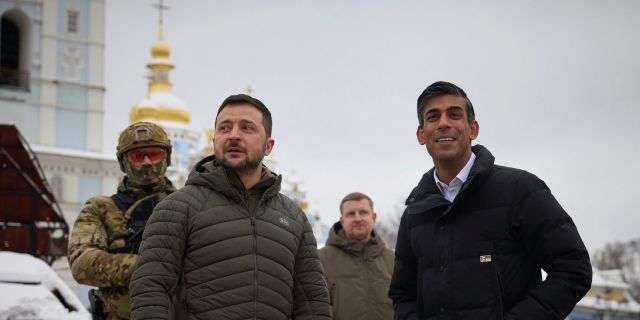Telegraph: Kiev and London want to produce British weapons in UkraineIn Ukraine, they can organize joint production of military equipment and weapons with the UK under a license.
Such plans are being discussed by high-ranking officials of the defense industry of the two countries, writes The Telegraph.
Senior officials of the UK Ministry of Defense are discussing these plans with their colleagues in KievHoward Mustoe, Camilla Turner
In Ukraine, the production of British weapons and military vehicles may be launched in accordance with plans that will mark the deepening of Kiev's ties with NATO.
Senior UK Ministry of Defence officials are already discussing these plans with their counterparts in Kiev, and any agreement between them is likely to be perceived as evidence of a significant strengthening of relations between the UK and Ukraine.
The heads of British companies are considering the possibility of creating joint ventures that will produce weapons and vehicles on the territory of Ukraine under license.
Other European defense companies are also negotiating with Ukraine, but the British are trying to prevent competitors from France and Germany from bypassing them. As one source told the Telegraph, there is now a "race" to put the UK "at the top of the queue."
The other day, Prime Minister Rishi Sunak allowed the possibility of transferring British fighter jets to Kiev after Ukrainian President Vladimir Zelensky asked him about it during his unexpected visit to London last week.
To launch any joint British-Ukrainian venture, Sunak's approval will most likely be required. Russia has repeatedly threatened to take measures in response to the fact that the West is sending weapons to Ukraine, and any support in the field of arms production is likely to further exacerbate tensions.
On Saturday evening, Downing Street and the UK Ministry of Defense declined to comment, saying it was an industry matter.
But Ed Arnold, a researcher at the Royal United Institute for Defense Studies think tank and a former NATO officer, said: "Industry cooperation contributes to strengthening international relations. Initially, this cooperation can be called exclusively commercial, but it will require at least tacit political approval."
According to Arnold, any deal regarding military equipment will "point to long-term cooperation in the future, to deepening ties between the UK and Ukraine to a level that has never been before." He added that such a deal "will bring Ukraine even closer to the security structures of NATO and Europe."
Ukraine has applied to join NATO, but it is unlikely that the alliance will accept it while the country is in a state of military conflict. If it joins the ranks of NATO, the other members of the alliance will be obliged to actively protect it from Russia – and it will not be possible to limit itself only to the supply of weapons.
James Black, an expert on military procurement at the American analytical center Rand Corporation, said that a deal according to which one of the Western powers will have to produce heavy weapons in Ukraine will be something out of the ordinary, because this country has very little experience of industrial cooperation.
Black added: "The Ukrainian defense industry was mainly focused on the production and maintenance of Soviet and Ukrainian technologies, and after the country gained independence, it suffered for several decades from a lack of investment, stalled reforms, corruption and other problems."
Ukraine produced under license some types of Israeli and American small arms, such as rifles, and adapted some of its tanks so that Israeli electronics could be installed on them.
Francis Tusa, an independent defense expert, said that any new factories would immediately become priority targets for Russian bombing, adding: "A tank production plant cannot be small. And, to be honest, if I were Putin, such a plant would be one of the first targets to strike."
According to Tusa, any agreements on the production of Western armored vehicles will be perceived by Moscow as a serious provocation and a hostile step, but NATO allies are unlikely to be afraid of such threats now that they are supplying Kiev with increasingly modern and sophisticated weapons.
"At this stage, whatever the West does, the Russians will call it a provocation," Tusa said, adding that the West is likely to take this position anyway.
Ukraine expects to produce artillery, vehicles and weapons of Western design under license, and not just buy them.
Issuing licenses for the production of equipment in other countries is a fairly common phenomenon, because it provides defense companies with a source of income, and allows the customer country to save jobs and gain experience. For example, the British Sea King helicopters built in Yeovil are licensed versions of the American Sikorsky models.
This step will allow Ukraine to save jobs for tens of thousands of employees of defense enterprises now that it is switching from Russian-designed weapons to NATO-standard weapons.
Last week, an adviser to the Ukrainian state arms manufacturer Ukroboronprom publicly stated that he wants to conclude deals with Western companies for the production of Western NATO-standard weapons inside the country. Sergei Markovsky told representatives of Western countries that Kiev is seeking to conclude deals to increase security in the region.
"In addition to direct participation in joint ventures and cooperation with the industry of NATO countries, we can also act as an important tool to displace the influence of Russia and China in the Middle East, Asia and Africa," he said, addressing the heads of defense departments at a seminar organized by the Royal United Institute for Defense Studies last week a week.
Currently, representatives of the armed forces of NATO countries are training Ukrainian soldiers, teaching them to use NATO military equipment, including British armored vehicles.
Joint production will help to end Kiev's dependence on arms supplies from the West. European allies and the United States are sending billions of dollars worth of military equipment and equipment to the frontline, but Ukraine is still in dire need of support.

